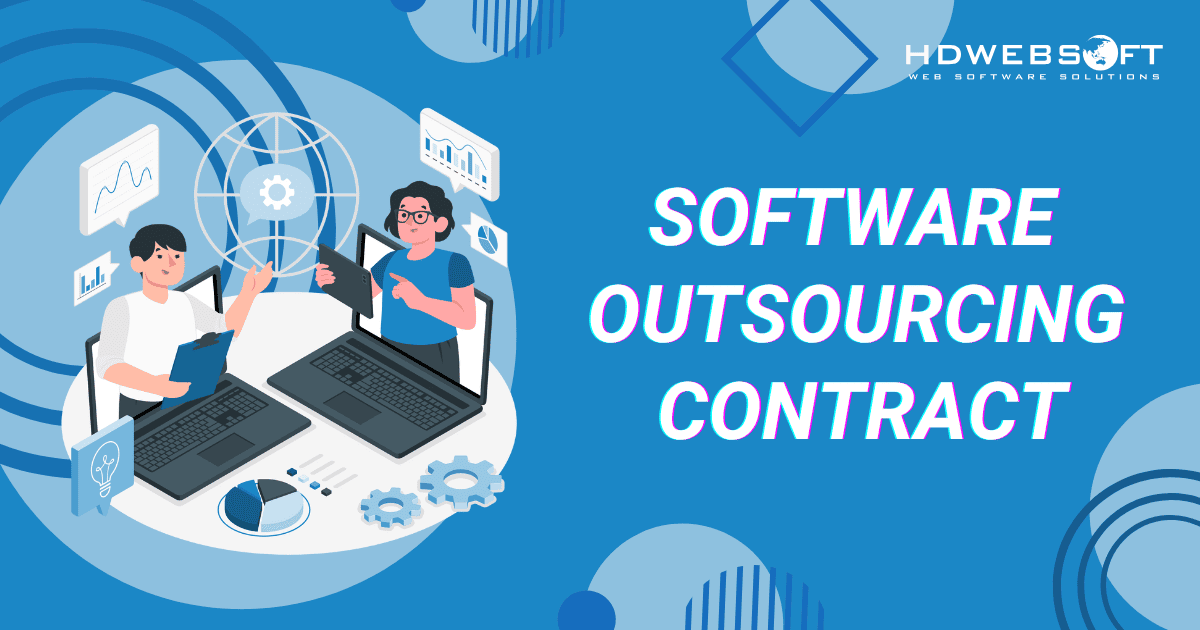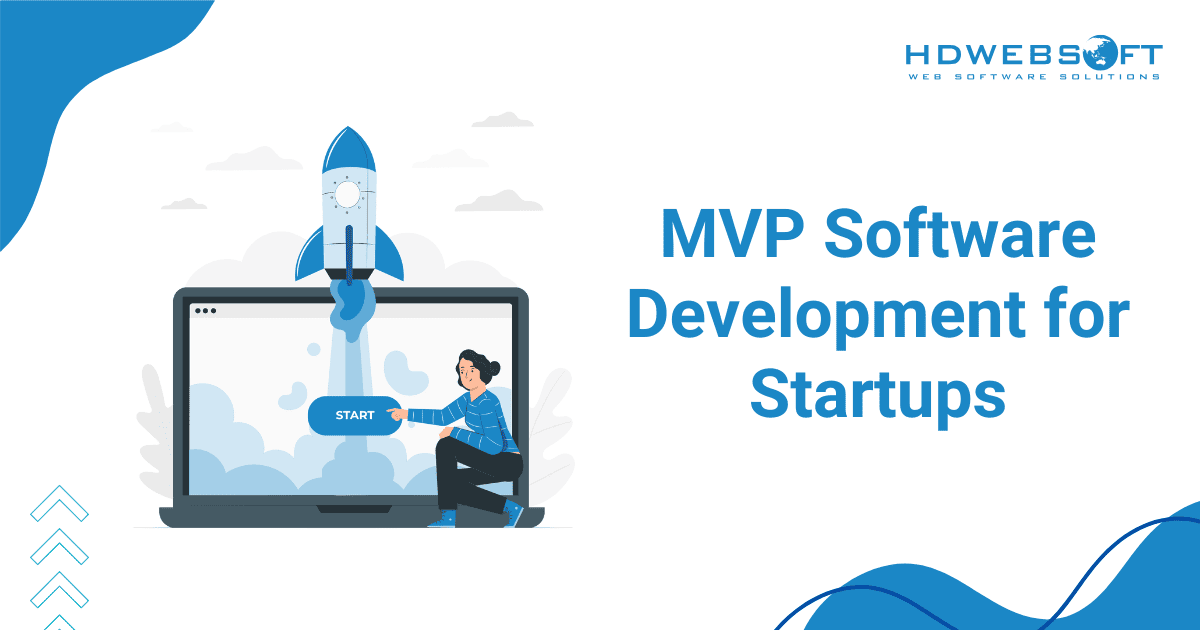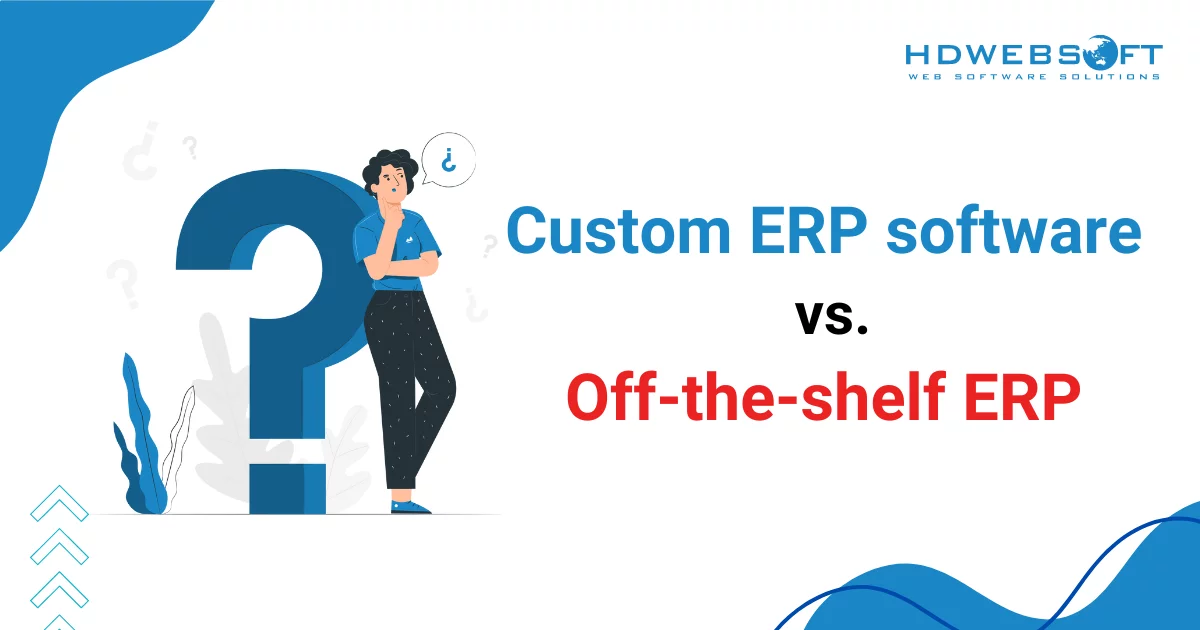
Custom ERP software vs. Off-the-shelf ERP
ERP software is crucial for streamlining operations, improving productivity, and driving growth in today’s competitive business environment. Whether a business opts for off-the-shelf or custom ERP software can significantly impact its operations, scalability, and overall success. This blog will explore the need for ERP systems, compare off-the-shelf and custom ERP solutions, and discuss factors to consider when choosing the right ERP system for your business.
Why is the ERP System Important?
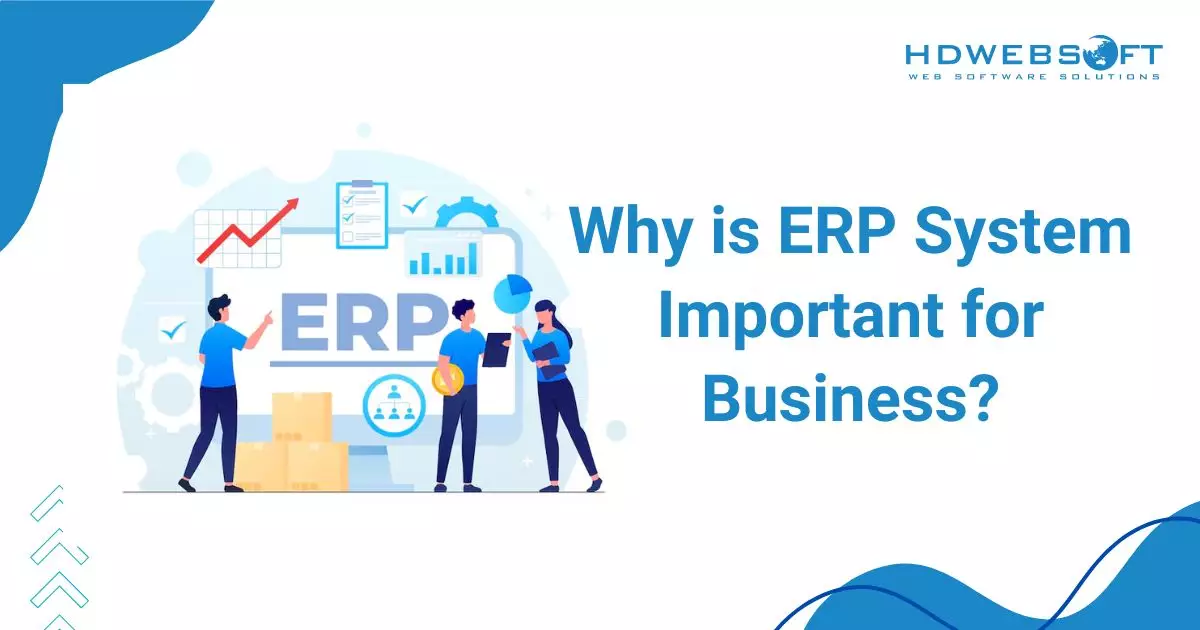
If your business has outgrown its current financial software, it’s time to consider an ERP system. Whether you’ve hit the limits of basic accounting software or your existing ERP can’t keep up with your growth, enterprise software development can provide the solution you need.
ERP software is primarily valuable because it brings together crucial data from different parts of a business into one place. This means less time spent manually inputting data and ensures everyone in the company can easily access the information they need.
According to Statista, enterprise software spending skyrocketed in 2023, reaching a whopping $913 billion globally. This represents a massive 12.4% increase from the previous year. In fact, the enterprise software market is the fastest-growing sector in the entire IT industry, with annual growth consistently exceeding 10%.
Custom ERP software development offers significant advantages across various industries. Sectors such as manufacturing, distribution, construction, business services, healthcare, automotive, transportation, logistics, and telecommunications often reap the most benefits. We’ll delve deeper into this later in the article.
Off-the-shelf ERP software
Off-the-shelf ERP software is a pre-built solution designed to address the common needs of businesses across various industries. It comes with standard features and functionalities that can be deployed relatively quickly.
Advantages of out-of-the-box ERP solutions
These pre-built systems provide a solid foundation for operations and can be a cost-effective choice for many organizations.
Quick Implementation
One of the primary advantages of an off-the-shelf ERP system is its speed of implementation. Since the software is pre-built and pre-configured, businesses can deploy it much faster than custom ERP systems. This rapid deployment allows companies to start benefiting from the ERP solution sooner, which is particularly important for businesses looking to address immediate operational challenges.
Lower Initial Costs
Off-the-shelf ERP solutions generally have a lower initial cost compared to custom ones. The development costs are spread across multiple customers, making it more affordable for small and medium-sized enterprises (SMEs). Additionally, these solutions often come with predefined processes requiring minimal customization, reducing the upfront investment.

Off-the-shelf ERP software offers lower initial costs for business.
Proven and Reliable Functionality
Ready-made ERP software is typically well-tested and widely used across different businesses. This means that the software has been refined and optimized based on real-world feedback, leading to a reliable and stable product. Businesses can trust that the core functionalities will work as expected without the need for extensive testing and debugging.
Regular Updates and Vendor Support
Out-of-the-box ERP software vendors regularly release updates to ensure the system remains compliant with industry standards and adapts to new technologies. These updates often include security patches, new features, and performance improvements.
Furthermore, businesses can rely on vendor support for troubleshooting, training, and system maintenance, reducing the burden on internal IT teams.
Disadvantages of ready-made enterprise system
While off-the-shelf ERP software offers many advantages, it also comes with certain limitations. Let’s explore some of the drawbacks associated with these pre-built solutions:
Limited Customization
The most significant drawback of off-the-shelf software is its limited customization options. Because it is designed to meet the needs of a broad range of businesses, it may not perfectly align with a particular company’s specific processes or workflows.
As a result, businesses may need to adapt their processes to fit the software, which can lead to inefficiencies or require workarounds.
Feature Overload
Off-the-shelf ERP software often includes a wide range of features designed to cater to various industries and business sizes. However, not all of these features may be relevant to your business. Unnecessary functionalities can clutter the user interface and complicate the system, making it harder for employees to navigate and use it effectively.

Off-the-shelf ERP software may include many unnecessary features that may cause feature overload.
Vendor Dependency
With ready-made solutions, businesses are dependent on the vendor for updates, support, and future developments. If the vendor discontinues the product or significantly changes its pricing model, it can leave businesses in a difficult position.
Moreover, integrating the ERP system with other software or customizing it to fit unique requirements may require vendor assistance, leading to potential delays and additional costs.
Applicability across industries
Off-the-shelf ERP software is designed to be versatile and applicable across a wide range of industries. However, its effectiveness depends on the complexity of the business processes and the degree of customization required.
Automotive
In the automotive industry, ready-made enterprise systems can help manage complex supply chains, manufacturing processes, and regulatory compliance. These systems’ standard features can meet the needs of many automotive businesses.
However, the industry’s unique requirements for parts traceability, warranty management, and compliance may require additional customization or specialized modules.
Manufacturing and Retail
Out-of-the-box systems offer manufacturing and retail businesses strong inventory management, production planning, and sales tracking capabilities. These systems can streamline operations and improve efficiency, making them suitable for many companies. Despite that, businesses with unique production processes or specialized retail needs might encounter limitations with standard features.
Distribution and Wholesale
Off-the-shelf ERP software is particularly well-suited for distribution and wholesale industries, where it can effectively manage logistics, inventory, and order fulfillment. These systems provide real-time visibility into stock levels, shipments, and customer orders, helping businesses optimize their supply chains. However, businesses with highly specialized distribution models may require additional customization.
FoodTech
In the FoodTech industry, ready-made software can assist with supply chain management, compliance with food safety regulations, and traceability. While these systems can handle many standard operations, businesses with specific needs related to food production, quality control, or specialized distribution channels may need to seek additional customization or industry-specific solutions.
Custom ERP software
Custom ERP software refers to Enterprise Resource Planning systems specifically designed and developed to meet the unique requirements of a particular business. It’s built from the ground up, providing a tailored fit for the company’s processes, workflows, and objectives.
Advantages of tailored ERP system
A custom ERP system offers several distinct advantages:
Full Customization and Flexibility
One of the most significant advantages of bespoke ERP is its ability to be fully customized to meet a business’s specific needs. Whether it’s integrating unique workflows, automating specialized processes, or accommodating industry-specific regulations, custom ERP systems can meet these needs. They are built to fit the exact requirements of the organization.
Additionally, as most software is shifting to cloud solutions, cloud-based ERP will offer the flexibility of remote access and scalability, further enhancing the customization and adaptability of the system. They are built to fit the exact requirements of the organization.
This level of customization ensures that the software aligns perfectly with the company’s operations, leading to greater efficiency and effectiveness.
Scalability and Future-Proofing
Custom ERP software is designed with the future in mind. As a business grows and evolves, its processes and requirements will likely change. It can be scaled and modified to accommodate these changes, ensuring that the system remains relevant and effective over time. This scalability is crucial for businesses that anticipate growth, expansion, or changes in their operational structure.

Custom ERP software provides businesses with scalability and a future-proof solution.
Competitive Advantage
Businesses can gain a competitive edge by investing in a custom ERP system. Tailor-made solutions can be designed to implement unique business strategies, optimize specific operations, and provide features not available in off-the-shelf solutions. This competitive advantage can be particularly valuable in industries where differentiation and innovation are key to success.
Integration with Existing Systems
Custom ERP solutions can be frictionlessly integrated with a company’s existing software and systems. Whether it’s legacy systems, specialized tools, or third-party applications, they can be developed to work in harmony with the company’s existing technology stack. This integration ensures smooth data flow across all systems, reducing the risk of data silos and improving overall operational efficiency.
Disadvantages of bespoke ERP systems
While custom ERP software offers significant advantages, it also comes with certain challenges:
Higher Initial Costs
One of the primary drawbacks of a tailored system is its higher initial cost compared to off-the-shelf solutions. Developing an ERP system requires significant investment in terms of time, resources, and expertise. The cost of custom development can be a barrier for smaller businesses or those with limited budgets.
Longer Development Time
Bespoke enterprise systems take longer to develop and implement than off-the-shelf solutions. The process involves detailed analysis, design, development, testing, and deployment phases, all of which require considerable time. For businesses that need a quick solution, the extended development timeline of custom ERP software can be a disadvantage.

Long development time may be a disadvantage of custom ERP software solutions.
Maintenance and Upkeep
Once a custom solution is implemented, ongoing maintenance and updates are necessary to ensure the software remains functional, secure, and up-to-date with the latest technologies. Unlike off-the-shelf solutions, which receive regular updates from the vendor, the ERP software requires dedicated support from the development team or an external service provider, which can add to the overall cost.
Risk of Over-Customization
While customization is a significant advantage of tailor-made ERP solutions, there is a risk of over-customization. If the system becomes too complex or tailored, it can be challenging to maintain, update, or scale. Ultimately, over-customization can also lead to difficulties in onboarding new users or integrating with new technologies.
Applicability across industries
Custom ERP software is designed to perfectly align with a specific organization’s unique processes and needs. However, its effectiveness hinges on the depth of understanding of the business requirements and the ability to translate them into functional software.
Healthcare
The healthcare industry often requires highly specialized ERP systems to manage patient records, billing, regulatory compliance, and medical inventory. Custom solutions can be developed to meet healthcare providers’ stringent requirements, ensuring that the system is secure and compliant with industry regulations such as HIPAA.
Finance
Financial institutions and services often need tailored solutions to manage complex financial transactions, risk management, compliance with regulatory standards, and customer relationship management. Custom ERP software allows these institutions to implement unique financial models, integrate with other financial systems, and adapt to changing regulatory environments.
Retail and E-commerce
In the retail and e-commerce sectors, custom ERP software can provide a significant advantage. It offers personalized features such as advanced inventory management, dynamic pricing, customer loyalty programs, and integration with various sales channels. This level of customization helps businesses optimize their operations and provide a better customer experience.
Key Factors in Choosing an ERP Solution for Business
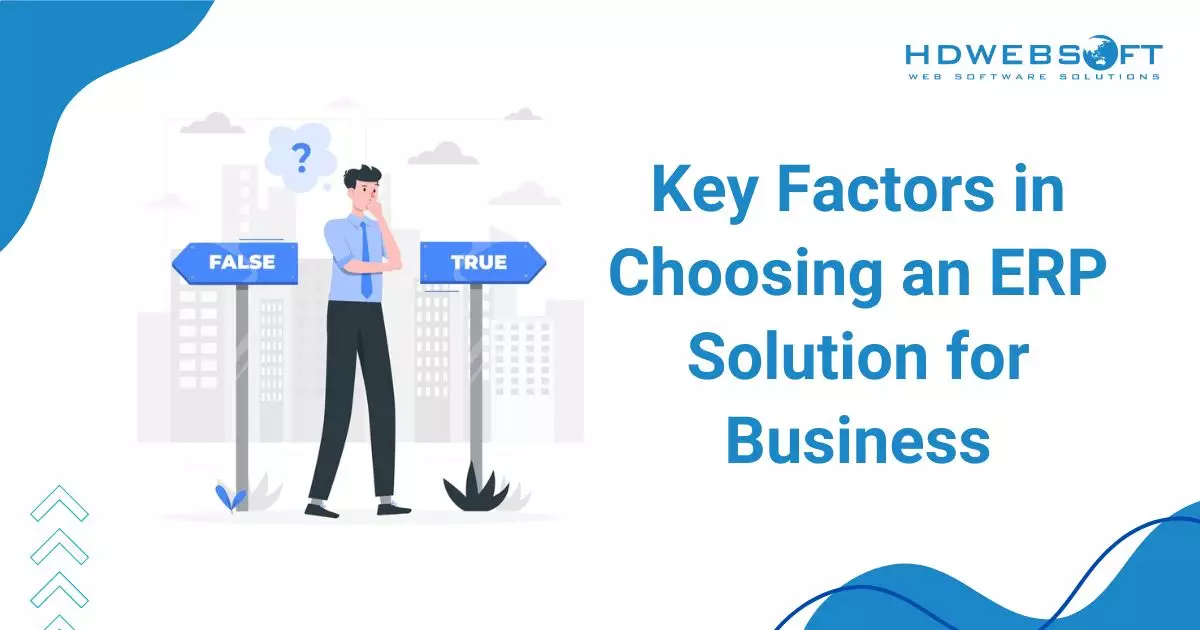
Selecting the right ERP software solution is a critical decision for any business as it’s the foundation for a successful ERP implementation. There are several key factors to keep in mind to make an informed decision:
Business Process Compatibility
- Off-the-Shelf ERPs: These systems cater to a broad range of businesses, so they might not perfectly align with the specific needs of individual companies. This can result in missing features or added complexity.
- Custom ERPs: Custom ERP systems allow businesses to fully address their specific needs, which is especially crucial for industries with complex and specialized operations.
Financial Considerations
- Off-the-Shelf ERPs: Subscription-based ERP software typically requires lower upfront costs. However, ongoing maintenance and support fees can add to the total expenditure over time.
- Custom ERPs: While requiring a larger initial investment, custom ERP systems can potentially lower operational costs in the long run by decreasing reliance on external software solutions.
Data Protection
- Off-the-Shelf ERPs: When using a pre-built ERP system, both the vendor and the business share responsibility for security. The vendor primarily handles system security by implementing protective measures and regular updates.
- Custom ERPs: Custom ERP systems offer stronger data protection by including security features tailored to your business. While this provides enhanced security, it requires continuous investment in updates and security checks.
System Integration
- Off-the-Shelf ERPs: Provide standard integrations for common applications, helping businesses with limited tech expertise.
- Custom ERPs: Custom ERP solutions effortlessly integrate with various business and third-party systems through adaptable APIs.
Check out how HDWEBSOFT integrated ERP systems to an All-in-one Seller Workspace.
Future Growth Support
- Off-the-Shelf ERP: Scalability is often an option, but it might come with additional costs, especially for more users.
- Custom ERP: Enable strategic scalability planning that aligns with business growth objectives, avoiding unexpected costs.
Conclusion
ERP software is undeniably a cornerstone of modern business operations. It is a powerful tool that can transform your business operations, but the right solution varies from one company to another. Ultimately, selecting the right ERP solution involves a careful evaluation of many factors.
HDWEBSOFT specializes in developing tailored enterprise solutions that perfectly align with your business objectives. Our expert team combines industry knowledge with cutting-edge technology to create efficient, scalable, and secure ERP systems. By partnering with HDWEBSOFT, you can unlock your business’s full potential and gain a competitive edge.
Remember, the ERP system is not just a software tool; it’s a strategic investment that can significantly impact your organization’s performance.







